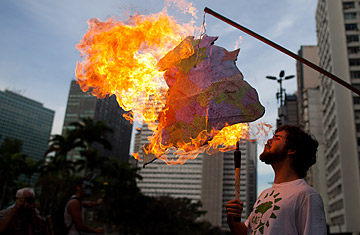
An activist burns a Brazilian map as he protests during the United Nations Conference on Sustainable Development, also known as Rio+20, in Rio de Janeiro on Monday, June 18, 2012
First the bad news: the planet is in peril. On June 6, an international team of scientists published a study in the journal Nature warning that because of human activity, Earth is reaching a potentially catastrophic tipping point. Humans have already radically altered 43% of the planet's surface, far more than the smaller changes that helped trigger the last great global shift during the Ice Ages 11,000 years ago. On top of that, a U.N. report released earlier this month found that about 20% of vertebrate species are under threat of extinction, coral reefs have declined by 38% since 1980, greenhouse-gas emissions could double over the next 50 years, and 90% of water and fish samples from aquatic environments are contaminated by pesticides. Oh, and internationally, significant progress has been made in only 4 out of the 90 most important environmental goals designated by environmental experts.
Now here's the really bad news: we seem to be completely incapable of doing anything about it all. On June 20, thousands of delegates from around the world will convene in Rio de Janeiro for what's officially called the U.N. Conference on Sustainable Development. It's better known as the Rio+20 Earth Summit, marking 20 years since the original Earth Summit, also held in Rio, at which more than 100 world leaders, including then U.S. President George H.W. Bush, met to address global environmental threats. The challenges were grim, but there was hope that a post–Cold War world could join together to fix them. "We must leave this Earth in better condition than we found it," Bush said in Rio that year. "Our village is truly global."
But 20 years on, Earth is in even worse condition, and the unmanageably large global village is the reason. Take climate change. In 1992, the vast majority of carbon emissions came from developed nations like the U.S., Japan, Germany and the former Soviet Union. While they had their political and economic differences, those countries had the sort of common goals that provided a framework for meaningful diplomacy. Whether it was earlier environmental pacts like the Montreal Protocol, which reduced ozone-depleting substances, or global arms control or trade, back then a relatively small club of nations could sit down together and hash out a deal that benefited all of them. Global cooperation wasn't easy, but it was possible — and ultimately, the U.S., as the sole superpower, could always provide an extra nudge.
So it was, initially, with environmental issues: the first Rio summit produced the U.N. Framework Convention on Climate Change, the treaty that committed the nations of the world to fighting global warming and set in motion international climate diplomacy. But in the years since, nearly all of the increase in global carbon emissions has come from large developing nations like China and India — nations with very different priorities. If it was hard to tackle a global problem like climate change when just a few rich nations needed to come to an agreement, it became nearly impossible when China, India and other developing nations had seats at the table. Suddenly there were a lot more voices with a lot more diverging interests. The noise made meaningful consensus impossible.
It's no surprise, then, that in the years since Rio, the international community has made little progress in restraining global carbon emissions. The 1997 Kyoto Protocol was hobbled by the fact that the U.S. Senate rejected it by a razor-thin 95-0 vote — and that was because China and other major developing nations refused to take on their own carbon cuts. Efforts to forge a truly global deal blew up at the 2009 U.N. climate conference in Copenhagen, when it became clear that 191 countries would never agree on how to apportion responsibility for fixing a global climate crisis. The international environmental-control process has ground to a halt, even as the planet keeps warming, with 2012 on track to be the hottest year on record.
But it's not just environmental threats that the international community seemingly lacks the will to solve. From the global financial crisis to the euro meltdown to the paralysis over Syria, the world is experiencing a deficit in global cooperation and leadership at the very moment that countries need to join together. We're stuck in what Eurasia Group president Ian Bremmer calls the G-Zero World, one in which no single nation or coalition of nations — in the declining West or the rising East — is strong enough to lead. The result: inaction, inertia and failure.
The Rio+20 summit won't get the attention its predecessor earned, in part because fear of a pending global economic catastrophe has largely crowded out all of the other looming disasters. But while little of substance will come out of Rio, that doesn't mean the threat to the planet has gone away. Far from it. We may be utterly divided on how to fight climate change, but we'll suffer the consequences together.
